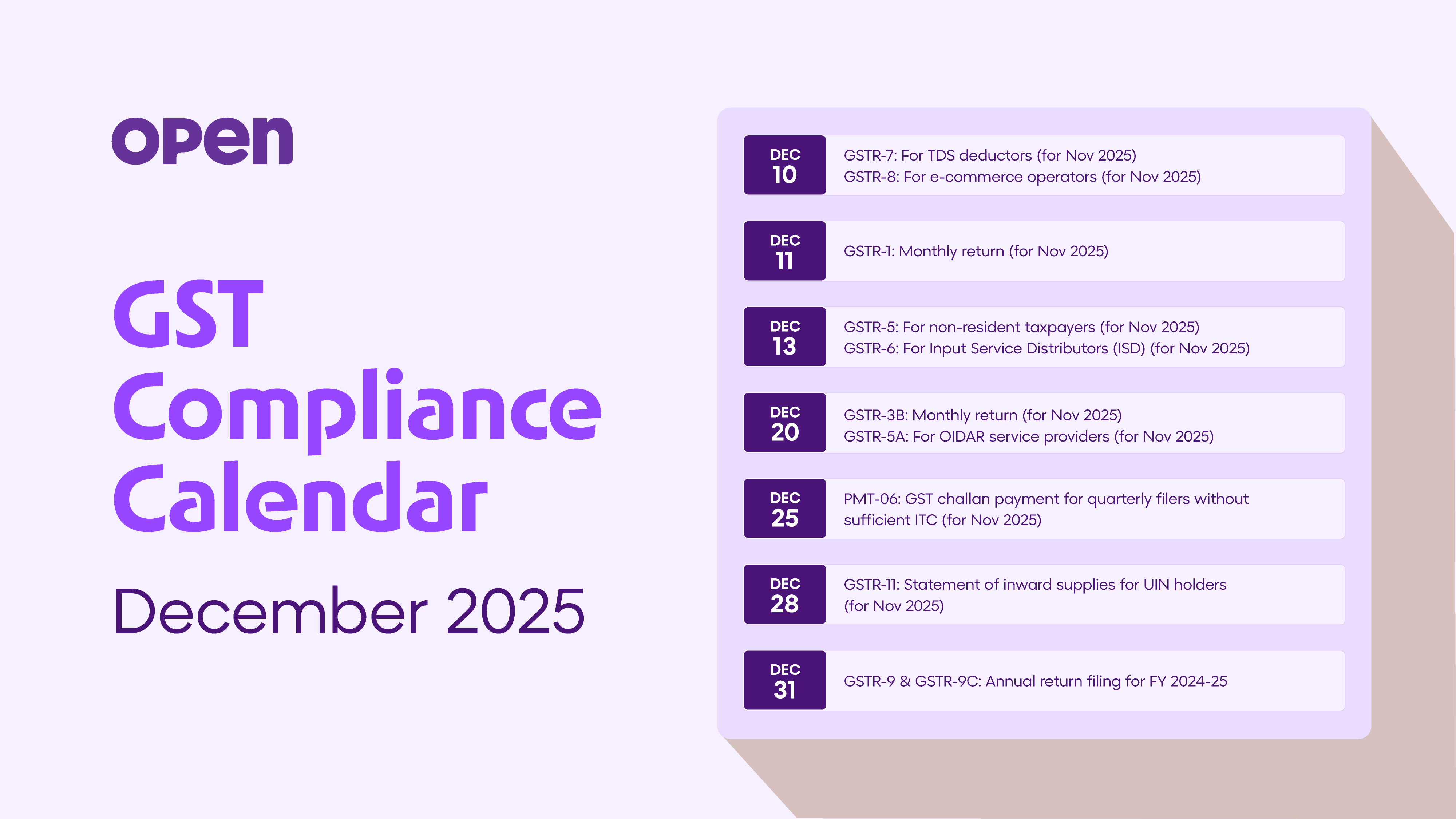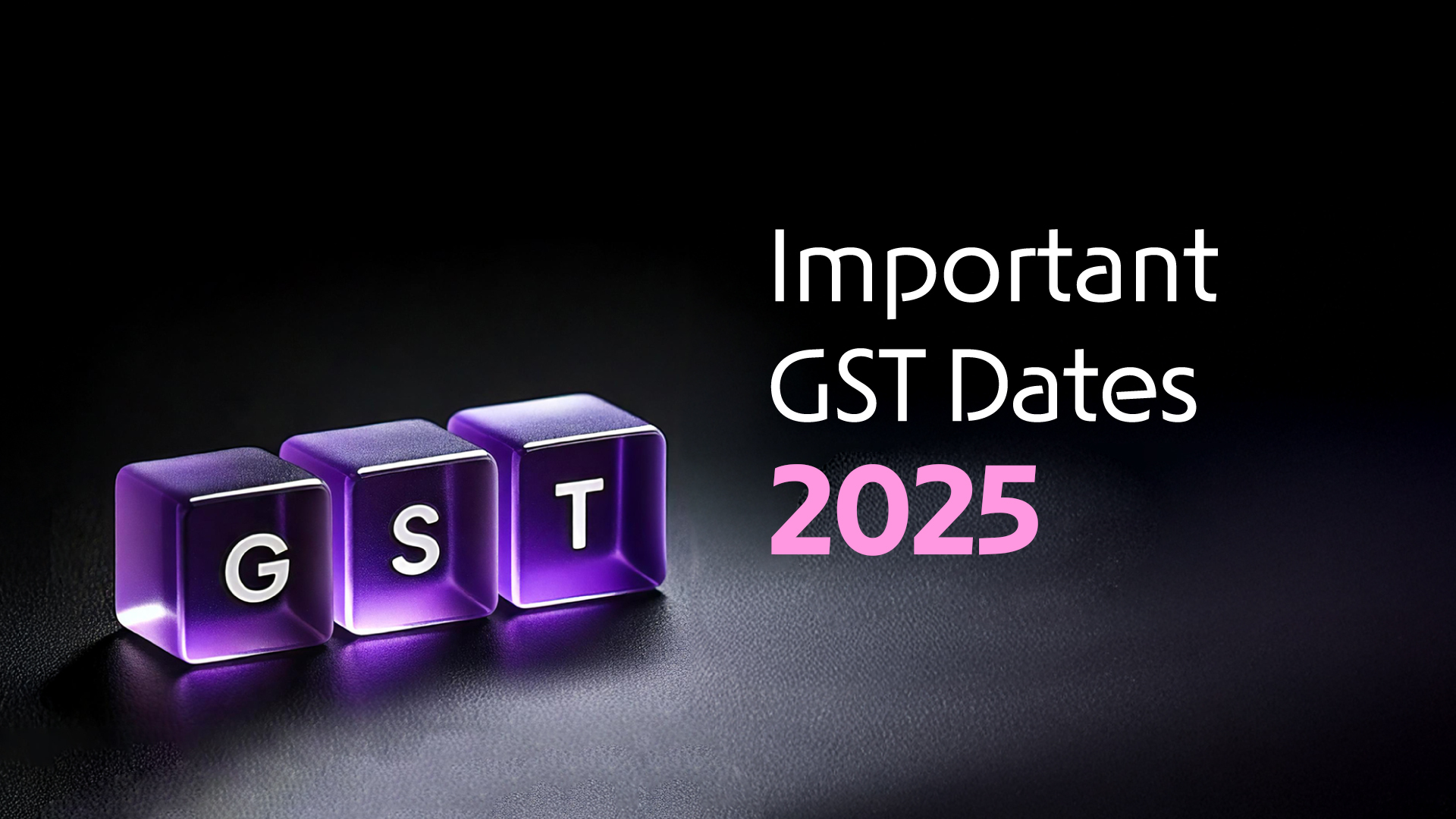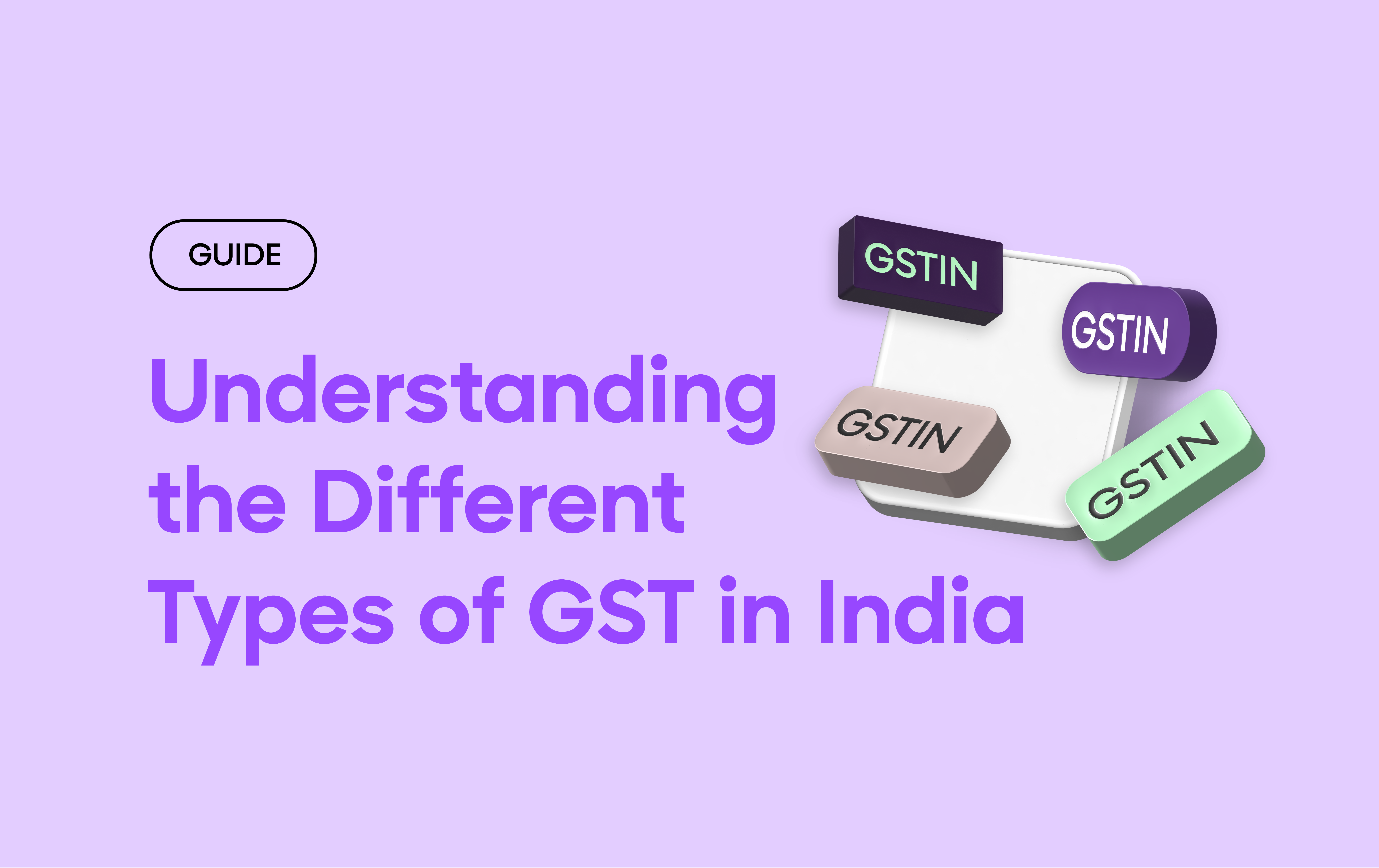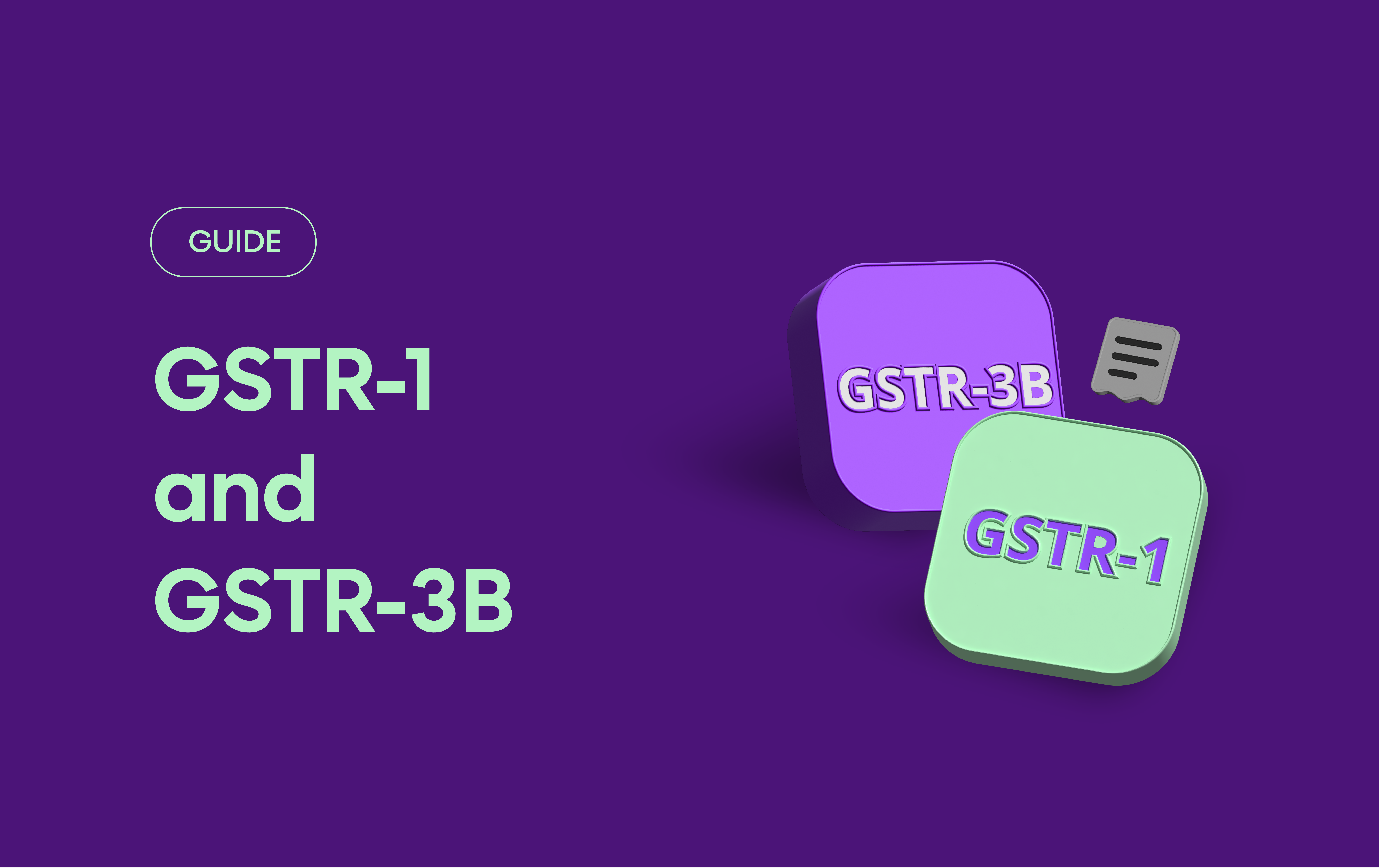Find the GST calendar 2026 here
GST compliance is a crucial part of every business operating under India’s Goods and Services Tax (GST) regime. Missing deadlines for filing GST returns can lead to penalties and interest, making it essential for taxpayers to stay on top of their GST obligations. To help you stay compliant, here’s a comprehensive GST calendar 2025, detailing the key due dates for filing GST returns and other important deadlines.
This guide is designed to be updated monthly to reflect changes in regulations or announcements from the GST council. Bookmark this page for the latest updates on GST filing timelines.
GST Due Dates in December 2025

GST Due Dates in November 2025
Download November 2025 GST Calendar
GST Due Dates in October 2025
Download October 2025 GST Calendar
GST Due Dates in September 2025
Download September 2025 GST Calendar
GST Due Dates in August 2025
Download August 2025 GST Calendar
GST Due Dates in July 2025
Download July 2025 GST Calendar
GST Due Dates in June 2025
Download June 2025 GST Calendar
GST Due Dates in May 2025
Download May 2025 GST Calendar
GST Due Dates in April 2025
Download April 2025 GST Calendar
GST Due Dates in March 2025
Download March 2025 GST Calendar
GST Due Dates in February 2025
Download February 2025 GST Calendar
GST Due Dates in January 2025
Download January 2025 GST Calendar
GST Due Dates in December 2024
Download December 2024 GST Calendar
Annual GST Calendar
| GST Form | Description | Due Date (Recurring) |
| GSTR-1 | Monthly details of outward supplies | 11th of the following month |
| GSTR-3B | Summary return and tax payment | 20th of the following month |
| CMP-08 | Quarterly payment for Composition Scheme | 18th of the month after the quarter ends |
| GSTR-4 | Annual return for Composition taxpayers | 30th April (once a year) |
| GSTR-5 | Return for non-resident taxable persons | 20th of the following month or within 7 days of expiration of registration |
| GSTR-6 | Return for Input Service Distributors (ISD) | 13th of the following month |
| GSTR-7 | Return for TDS deductors | 10th of the following month |
| GSTR-8 | Return for e-commerce operators | 10th of the following month |
| GSTR-9/9C | Annual return and reconciliation statement | 31st December (for FY 2023-24) |
GST Returns
GSTR-1: Statement of Outward Supplies
- Who Should File: Regular taxpayers, including casual taxable persons.
- What It Contains: Details of all outward supplies (sales) made during the month, including B2B and B2C transactions, exports, and credit/debit notes issued.
- Purpose: Enables recipients to claim Input Tax Credit (ITC) by auto-populating data in their GSTR-2A/2B.
- Due Date: 11th of the following month (for monthly filers); for QRMP taxpayers, it is filed quarterly.
GSTR-1 IFF: Invoice Furnishing Facility
- Who Should File: Taxpayers under the Quarterly Return Monthly Payment (QRMP) Scheme.
- What It Contains: Details of outward supplies (sales) for the first two months of a quarter, including B2B invoices, credit/debit notes, and exports.
- Purpose: Enables QRMP taxpayers to furnish invoice details monthly so their buyers can claim Input Tax Credit (ITC) promptly.
- Due Date: 13th of the following month.
GSTR-2: Return for Inward Supplies (Currently Suspended)
- Who Should File: Previously applicable to regular taxpayers.
- What It Contains: Detailed information on all inward supplies (purchases) during the tax period, including matching ITC claims with GSTR-1 filed by suppliers.
- Purpose: Facilitated ITC reconciliation and error correction.
GSTR-2A: Auto-Populated Inward Supplies Statement
- Who Should Use It: Regular taxpayers for ITC reconciliation.
- What It Contains: Auto-populated details of inward supplies based on GSTR-1, GSTR-5, and GSTR-6 filed by suppliers.
- Purpose: Helps taxpayers verify ITC eligibility and reconcile mismatches between their records and supplier filings.
- Due Date: Auto-generated and updated dynamically.
GSTR-2B: ITC Statement (Static Statement)
- Who Should Use It: Regular taxpayers.
- What It Contains: A static monthly statement of ITC that can be claimed or blocked based on supplier filings.
- Purpose: Provides a fixed reference for ITC reconciliation, making the process more streamlined and accurate.
- Due Date: Auto-generated after the 13th of the following month.
GSTR-3B: Summary Return and Tax Payment
- Who Should File: Regular taxpayers.
- What It Contains: A monthly summary of sales, purchases, ITC claimed, tax liability, and tax paid.
- Purpose: Simplifies tax filing and ensures timely tax payment. This is a self-declaration return without invoice-level details.
- Due Date: 20th of the following month (monthly filers); for QRMP taxpayers, it is filed quarterly.
CMP-08: Statement-Cum-Challan for Composition Scheme
- Who Should File: Taxpayers under the Composition Scheme.
- What It Contains: Details of turnover and tax payable for the quarter.
- Purpose: Ensures simplified compliance for small businesses with a flat tax rate.
- Due Date: 18th of the month following the quarter end.
GSTR-4: Annual Return for Composition Taxpayers
- Who Should File: Taxpayers under the Composition Scheme (instead of monthly returns like GSTR-1 and GSTR-3B).
- What It Contains: Summary of quarterly CMP-08 returns filed and tax paid during the financial year.
- Purpose: Simplified annual reporting for composition dealers.
- Due Date: 30th April of the following financial year.
GSTR-5: Return for Non-Resident Taxable Persons
- Who Should File: Non-resident taxable persons who operate in India temporarily.
- What It Contains: Details of sales and purchases made in India and tax paid.
- Purpose: Facilitates compliance for foreign entities engaged in taxable supplies in India.
- Due Date: 20th of the following month or within 7 days of registration expiry.
GSTR-5A: Return for Non-Resident OIDAR Service Providers
- Who Should File: Non-resident Online Information and Database Access or Retrieval (OIDAR) service providers supplying services to unregistered customers in India.
- What It Contains: Details of services provided, tax collected, and tax paid.
- Purpose: Ensures compliance for foreign service providers offering OIDAR services under GST.
- Due Date: 20th of the following month.
GSTR-6: Return for Input Service Distributors (ISD)
- Who Should File: Input Service Distributors, such as head offices distributing ITC to branches.
- What It Contains: Details of ITC received and distributed among different branches.
- Purpose: Enables proper allocation of ITC among different GST registrations within the same organization.
- Due Date: 13th of the following month.
GSTR-7: Return for TDS Deductors
- Who Should File: Tax deductors (e.g., government bodies or notified taxpayers).
- What It Contains: Details of TDS deducted and paid under GST.
- Purpose: Ensures TDS compliance and helps suppliers claim TDS credits.
- Due Date: 10th of the following month.
GSTR-8: Return for E-Commerce Operators
- Who Should File: E-commerce operators required to collect Tax Collected at Source (TCS).
- What It Contains: Details of supplies made through the e-commerce platform and TCS collected.
- Purpose: Facilitates tracking of e-commerce transactions and TCS compliance.
- Due Date: 10th of the following month.
GSTR-9: Annual Return for Regular Taxpayers
- Who Should File: Regular taxpayers registered under GST.
- What It Contains: Consolidated summary of outward and inward supplies, ITC claimed, tax paid, and adjustments for the financial year.
- Purpose: Provides an annual summary for reconciliation of GST data.
GSTR-9C: Reconciliation Statement
- Who Should File: Taxpayers with an annual turnover exceeding INR 5 crores (or as per GST Council notifications).
- What It Contains: Reconciliation of annual returns (GSTR-9) with audited financial statements.
- Purpose: Ensures accuracy and compliance through an audit by a Chartered Accountant or Cost Accountant.
GSTR-11: Statement for UIN Holders
- Who Should File: Taxpayers with a Unique Identification Number (UIN), such as embassies, consulates, and UN bodies, claiming GST refunds.
- What It Contains: Details of inward supplies and tax paid for which a refund is being claimed.
- Purpose: Enables specified entities to claim GST refunds on their purchases as permitted under GST law.
- Due Date: 28th of the month following the month in which supplies were received.
ITC-04: Job Work Return
- Who Should File: Manufacturers or principal businesses sending goods for job work.
- What It Contains: Details of goods sent to and received back from job workers, as well as goods sold from the job worker’s premises.
- Purpose: Tracks the movement of goods for job work and compliance with GST rules.
- Due Date: 25th of the month following the quarter.
Form PMT-06: GST Payment Challan
- Who Should File: Taxpayers under QRMP (Quarterly Return Monthly Payment) Scheme.
- What It Contains: Payment of tax liability for the first two months of a quarter.
- Purpose: Simplifies tax payments under the quarterly return filing scheme.
- Due Date: 25th of the following month.
FAQs on GST Filing Deadlines
What happens if I miss the GST filing deadline?
Late filing attracts a penalty of INR 50 per day for GSTR-3B and GSTR-1 (INR 20 per day for nil returns) and interest on tax dues.
Can GST returns be revised?
No, GST returns once filed cannot be revised. Errors can be corrected in subsequent returns.
How can I avoid missing GST deadlines?
Use automated GST compliance tools, such as those provided by Open Financials, to set reminders and ensure timely filing.
Why Stay Updated with GST Compliance?
Adhering to GST deadlines is not only essential to avoid penalties but also ensures smooth ITC claims, improves cash flow, and builds credibility with stakeholders. At Open Money, we provide integrated solutions to help businesses automate tax compliance and streamline financial operations.





